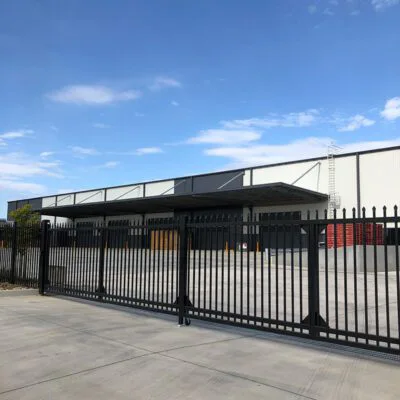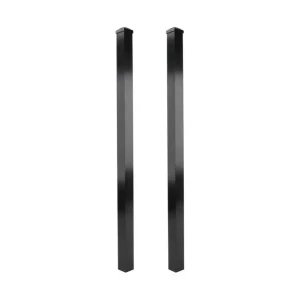
When it comes to enhancing the aesthetic appeal and security of your property, selecting the right fencing material is crucial. At FENCE DEPOT, we understand the importance of not just choosing a fence, but making an informed decision that aligns with your specific needs. Our comprehensive guide is designed to provide you with detailed insights into various fence materials and their applications. Whether you’re looking for durability, style, or environmental sustainability, we’ll help you navigate through the options to find the perfect solution for your fencing needs.
Steel is renowned for its strength and resilience, making it ideal for security fences. To improve corrosion resistance and extend life, steel fencing is often hot-dip galvanized, which provides 15-25 years of rust protection. Powder coating can extend the service life to 20-30 years.
Aluminum is a versatile and rust-resistant option, perfect for decorative and functional fencing. It’s particularly popular in coastal areas, thanks to its durability against saltwater corrosion. Aluminum fences are available in a variety of designs, from simple flat-top rails to elaborate ornamental styles.
Wood offers a natural look that complements any landscape. From cedar to redwood, different woods offer varying levels of durability and resistance to rot. Finishing options like paints and stains can also enhance the longevity and appearance of a wood fence.
Vinyl (PVC) fencing is favored for its superior durability and minimal maintenance requirements. It won’t warp, rot, crack or splinter, and is extremely resistant to UV rays, guaranteed to not fade or yellow for 20 years or more.
Wire fencing is primarily used for agricultural and livestock containment but can also serve as a cost-effective option for residential properties. Materials range from basic barbed wire to more robust welded wire or chain-link fences, ideal for securing large perimeters.
Generally composite materials combine wood fibers with recycled plastics for an eco-friendly fencing option that mimics the look of wood but with greater resistance to weathering. Composite fences are a popular choice for those looking for sustainability without sacrificing style.
For those seeking durability and intricate design, wrought iron is unmatched. Perfect for historical properties or elegant garden settings, wrought iron can be custom-crafted into a variety of ornate patterns.
Bamboo is a sustainable and fast-growing alternative that offers a unique aesthetic. It’s ideal for creating privacy screens or adding a tropical touch to garden settings.
Primarily used in agricultural settings, electric fences are effective for controlling livestock. They can also be utilized in residential properties to enhance security without obstructing views.
Chain link is a practical choice for both commercial and residential properties. It provides security and visibility, is cost-effective, and can be customized with slats or vines for added privacy.
Customize your fence with accessories such as lighting, electronic gates, and decorative post caps. These enhancements not only boost functionality but also add a touch of personal style.

Maintaining your fence is essential to preserve its appearance and functionality:
– Wood Fences: Regular staining or painting is necessary to prevent rot and insect damage.
– Vinyl Fences: These require little maintenance other than occasional washing to remove dirt and debris.
– Metal Fences: Inspect for rust spots annually, especially if you haven’t opted for a powder-coated option. Apply rust inhibitors and touch-up paint as needed.
Security is a major concern for many property owners. When choosing fencing materials, consider their potential to enhance your property’s security:
The integration of technology into fencing solutions has made significant strides:
Understanding the cultural and historical significance of fencing can influence your choice:
When deciding whether to install a fence yourself or hire professionals, consider the following:
A well-chosen fence can significantly enhance your property’s value:
Tailor your fence to meet your specific aesthetic and functional needs:
Selecting the ideal material for your fence involves considering maintenance, cost, durability, and aesthetic appeal. Evaluate your property’s needs, local climate, and long-term upkeep to determine the best material.
The fence industry is continuously evolving with innovations aimed at sustainability and efficiency. Recycled materials are increasingly popular in manufacturing eco-friendly fence options without compromising on strength or style.
Installing your fence properly is crucial to ensuring its longevity and effectiveness. Start by consulting local zoning laws to ensure compliance with all regulations. Preparation of the site involves marking utility lines, clearing vegetation, and ensuring the ground is level. Use proper tools like post-hole diggers and concrete mix for setting posts. Always consider hiring professionals for complex installations, especially for materials like wrought iron or composite that require special handling.
When planning your fence installation, consider both initial costs and long-term maintenance. Vinyl and composite fences, while initially more expensive, offer significant savings on maintenance. Conversely, wood, while cheaper upfront, requires ongoing care that can add up. Tailor your budget to the fence’s lifecycle cost to ensure it aligns with your financial goals.
Your fence can significantly impact your property’s curb appeal. Choose a design that complements your home’s architectural style. For traditional homes, a classic wood picket fence may be perfect, while modern homes might benefit from the clean lines of a metal or vinyl fence. Consider custom designs or additions like trellises for added personality and functionality.
Before installation, verify local fencing laws with your city or homeowner’s association. Restrictions often govern the height, materials, and placement of fences. Ensuring compliance can prevent legal issues and the need for costly modifications later.
Selecting eco-friendly fence materials like bamboo or recycled composite can reduce your environmental impact. Many suppliers now offer sustainable options that do not compromise on quality or durability. Furthermore, consider the manufacturing and transportation impact of your chosen materials.
At FENCE DEPOT, we leverage our extensive experience and cutting-edge technology to provide superior fencing solutions. As a professional fence manufacturer, we offer a wide range of high-quality fence panels and dedicated customer service. We have manufacturing processes for various materials such as steel, aluminum, PVC, etc., so we can meet customer needs for different products. At the same time, every member of our team has professional fence knowledge, so we can provide customers with professional services.
Choosing the right fence materials is more than just a practical decision—it’s a commitment to the safety, beauty, and value of your property. With the detailed information provided in this guide, you’re now equipped to make a choice that best suits your landscape, climate, and aesthetic preferences. We are committed to offering top-quality products and expert advice to ensure your fencing project is a success.